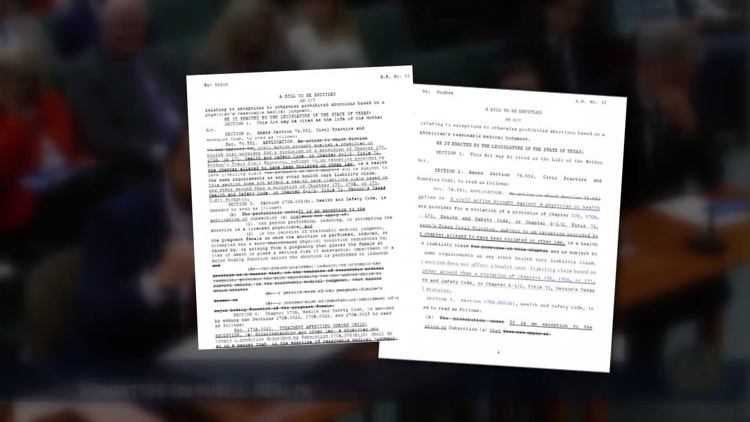AUSTIN, Texas — As Texas lawmakers continue to move legislation forward that would clarify medical exceptions to the state's near-total abortion ban , some abortion rights advocates are expressing concern about the "Life of the Mother" Act. The Texas Senate and Texas House of Representatives have versions of the abortion clarification bill. It has support from Democrats, Republicans, anti-abortion groups and health care professionals, but it's now facing some unexpected opposition from abortion-rights advocates, who say it's not what it seems.
A dispute over a 19th-century abortion law is complicating efforts to clarify the state's current ones. House Bill 44 and Senate Bill 31 do not expand abortion access or change any exceptions to the law but aim to clarify the existing law by making clear when doctors can intervene to save a pregnant patient's life. "This bill is directed at giving physicians in emergency situations the confidence to do what we're trained to do, save lives without delay and without fear," Dr.

Deborah Fuller with the Texas Medical Association said. The bills still require patients to have medical emergencies, but it clarifies that doctors don't have to delay care if doing so would increase the pregnant woman's risk of death or loss of bodily function. It also reiterates that doctors can remove ectopic pregnancies or the remains of a fetus after a miscarriage.
"We know women have died after care was delayed or denied. We know women have had to leave Texas for life-saving care. We know women's bodies have been horribly injured because doctors and hospitals are afraid to provide abortions that could save their bodies, and that's because of.
Some of the language in our current law is not clear to the doctors, the nurses, or the hospital," Rep. Charlie Geren (R-Fort Worth). "HB 44 will be able to save women's lives and protect them from substantial impairments of their major bodily function.
" ProPublica has reported that at least three pregnant women in Texas have died as a result of not getting care, and multiple women have sued the state, saying they were denied abortions even though their lives were at risk because the law is too vague. Medical experts who the publication spoke to said their lives could have been saved if doctors performed abortions. More than 100 Texas OB-GYNs signed an open letter urging state lawmakers to make changes.
Texas has some of the strictest abortion restrictions in the nation. Currently, doctors can only perform abortions if a woman's life is in danger or she's at risk of losing a major bodily function. Doctors who perform abortions can lose their medical licenses or face up to 99 years in prison or a $100,000 fine if they don't comply with the law, leaving many doctors afraid to perform the procedure .
While supporters say it gives doctors more power to act and save women's lives, abortion rights advocates say it doesn't do enough to clean up confusing medical language in existing law. "This law will not help me save anyone's life, but it will further endanger the few lives we are able to save," said Dr. Ghazaleh Moayedi, an OB/GYN at Pegasus Health Center.
Some believe the bill resurrects a 1925 Texas abortion ban statute that they worry paves the way to criminalizing people who get an abortion and anyone who "furnishes the means" for an illegal abortion. Texas's abortion funds, which are nonprofit groups that help pay for out-of-state abortions, fear that this would allow prosecutors to go after them specifically. "These bills would empower the state to prosecute anyone who helps the Texan access care out of state," said Anna Rupan, the Executive Director of Fund Texas Choice.
The law was put on ice by the United States Supreme Court's Roe v. Wade ruling, so for 50 years, they were on the books but not enforceable. However, some anti-abortion advocates, including Attorney General Ken Paxton, have argued those laws went back into effect when the high court reversed the ruling in 2022.
During a hearing in the House Public Health Committee on Monday, Democratic state lawmakers grilled anti-abortion groups. "You don't think this bill through, this clarification would change anything currently under the law otherwise that could restrict that," Rep. John Bucy (D-Austin) asked Texas Alliance for Life Director Joe Pojman, who responded, "No, sir, absolutely not.
" In response to the questions about their intent with the legislation and whether they had a desire to go after pregnant Texans and limit out-of-state abortions, Texas Right to Life Director John Seago told lawmakers, "There's an ongoing lawsuit about the validity of (the pre-Roe law) that's going to be settled," and it may "help the state in that case to reiterate that." He said he does not want to increase restrictions. Abortion rights advocates want the bill to be amended to ensure that people can't be prosecuted for helping someone seek an abortion outside of Texas.
"When we are forced to stop helping people, people will go without care," Maleeha Aziz, Texas Equal Access Fund, said. "When people go without care, they experience harm." Seago described the bill during Monday's hearing as a "work in progress," and Jennifer Allmon, the director of the Texas Catholic Conference of Bishops, indicated she is open to an amendment.
"There's no intent to prosecute a woman seeking an abortion," Allmon said. Lawmakers have left both HB 44 and SB 31 pending in committees. So they'll need to bring them both back up at future meetings and vote on them before they can go to the full chambers for consideration.
.
Politics

Texas lawmakers try to clear up abortion law but risk reigniting centuries-old restrictions

The bills don't expand access or exceptions but aim to clarify the existing law to make clear when doctors can intervene to save a pregnant patient's life.














